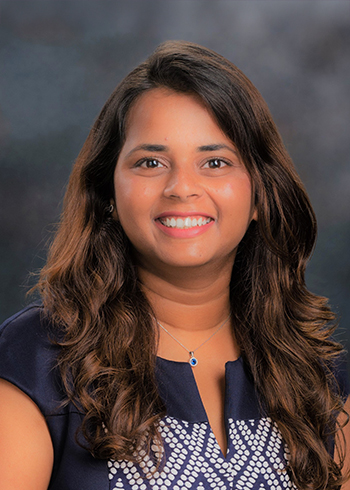Dr. Sayali Tungare is a dental public health researcher and informatician whose work integrates dentistry, clinical informatics and public health to improve the quality and safety of oral healthcare, with a particular focus on improving dental prescribing safety and post-procedural dental pain outcomes inpatients using real-world data and human-centered technology design. She currently serves as an Assistant Professor in the Department of Clinical and Health Informatics at UTHealth Houston’s McWilliams School of Biomedical Informatics.
Dr. Tungare is an alumna of the UTHealth Houston School of Public Health where she earned both her MPH and PhD in Epidemiology, after completing her Bachelor of Dental Surgery (BDS) from Maharashtra University of Health Sciences (India). She completed her postdoctoral research training and fellowship jointly through UTHealth Houston’s Postdoctoral Training Program, School of Dentistry and McWilliams School of Biomedical Informatics. While a student at UTHealth Houston, she has received multiple honors, including the UTHealth School of Public Health Dean’s Excellence Scholarship, the Outstanding New Student Award, and the UTHealth Student InterCouncil Leadership Award.
Dr. Tungare’s research focuses on leveraging real-world electronic health record (EHR) data and informatics tools to enhance prescribing practices, evaluate dental adverse events, and promote data-driven decision-making in dentistry. She has contributed to national and multi-institutional federally and locally funded initiatives supported by the National Institute of Dental and Craniofacial Research (NIDCR), the Agency for Healthcare Research and Quality (AHRQ), and the CareQuest Institute for Oral Health. Her research has used large-scale EHR datasets to analyze national trends in opioid and antibiotic prescribing in dentistry, assessed the utility of patient-reported outcomes in dental pain management and developed audit and feedback dashboards to reduce inappropriate opioid prescribing by dentists.
Recent publications by Dr. Tungare have appeared in JDR Clinical & Translational Research, BMC Oral Health, International Journal of Medical Informatics, and the Journal of Patient Safety. She also frequently presents her work at major conferences including American Association for Dental, Oral and Craniofacial Research (AADOCR), International Association for Dental Research (IADR) and American Public Health Association (APHA).
- Tell us about your research center and/or what research/work you are currently working on.
My work is based within dental informatics, public health and clinical decision support research ecosystem, where we focus on leveraging electronic health record (EHR) data and user-centered design to improve quality and safety in dental care. I currently lead and contribute to several federally funded projects that address inappropriate opioid and antibiotic prescribing and patient-reported outcome collection for dental pain management. Some of my recent work includes designing audit and feedback dashboards, conducting mixed methods evaluations of prescribing practices, developing evidence-based guidelines for appropriate antibiotic prescribing, and validating models that utilize natural language processing for analyzing chart notes from EHR data to determine prescribing guideline concordance.
- What type of student or Postdoctoral Fellow are you looking for to work in your center?
I welcome students and trainees who are curious, collaborative, and passionate about improving healthcare delivery and are interested in clinical data analysis while working on interdisciplinary teams applying both quantitative and qualitative research methods. Ideal candidates would have a background in public health or informatics. Prior experience with EHR data, data visualization, qualitative research, implementation science or human-centered design is a plus, but not required—we can build those skills together.
- What does the future of your research look like?
The future of my research lies in developing scalable, data-informed tools that make real-time feedback and evidence-based decision support accessible to dental providers. I am particularly excited about stewardship programs for reducing inappropriate prescribing, developing models for better predicting postoperative dental pain as well as expanding the measurement and integration of patient-centered outcomes within the EHR. My goal is to continue building research-practice partnerships that directly inform policy and improve quality and safety in dental care while having a larger public health impact.
- What does the future of informatics look like?
The future of informatics is intelligent, integrated, accessible and equity driven. As AI capabilities evolve, informatics will increasingly facilitate personalized, predictive care while reducing the cognitive burden on providers. Interoperability across health systems and disciplines—including medicine, dentistry, and public health—will be key. However, we must also remain committed to responsible design, human-centered interfaces, and inclusive data strategies to ensure that innovations truly benefit diverse patient populations.
- What courses do you teach?
Currently, I mentor trainees in qualitative research methods, mixed-methods research, and research that uses natural language processing of chart notes from the EHR data.
Education
- PhD, Epidemiology, UTHealth Houston School of Public Health, 2022
- MPH, Epidemiology, UTHealth Houston School of Public Health, 2018
- BDS, Dentistry, Maharashtra University of Health Sciences (India), 2015
Areas of Expertise
- Dental Informatics
- Mixed Methods Research
- Electronic Health Record (EHR) Data Analysis
- Prescription Drug Stewardship (Opioid and Antibiotic Prescribing)
- Patient-Reported Outcomes (PROs)
- Audit and Feedback Interventions
